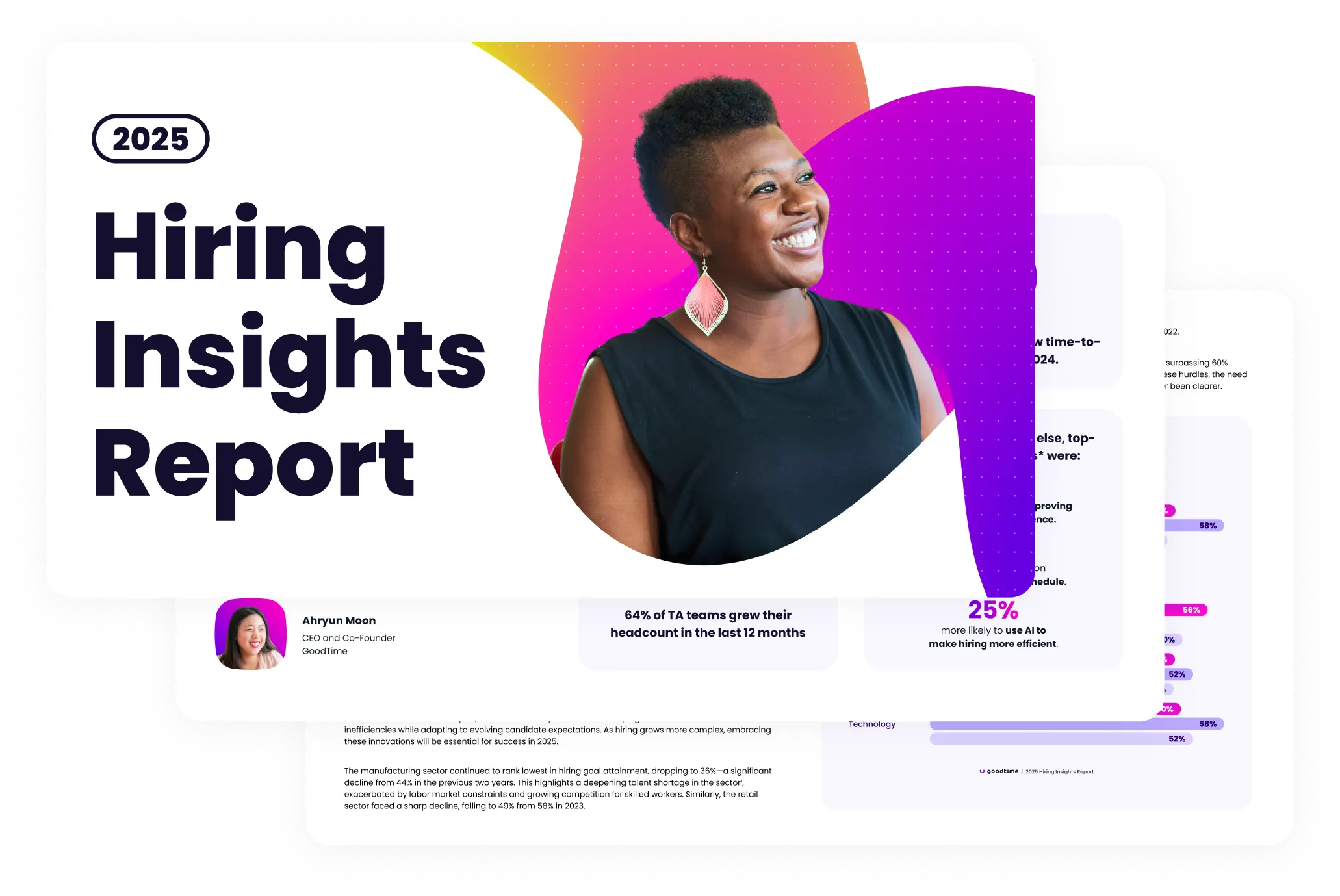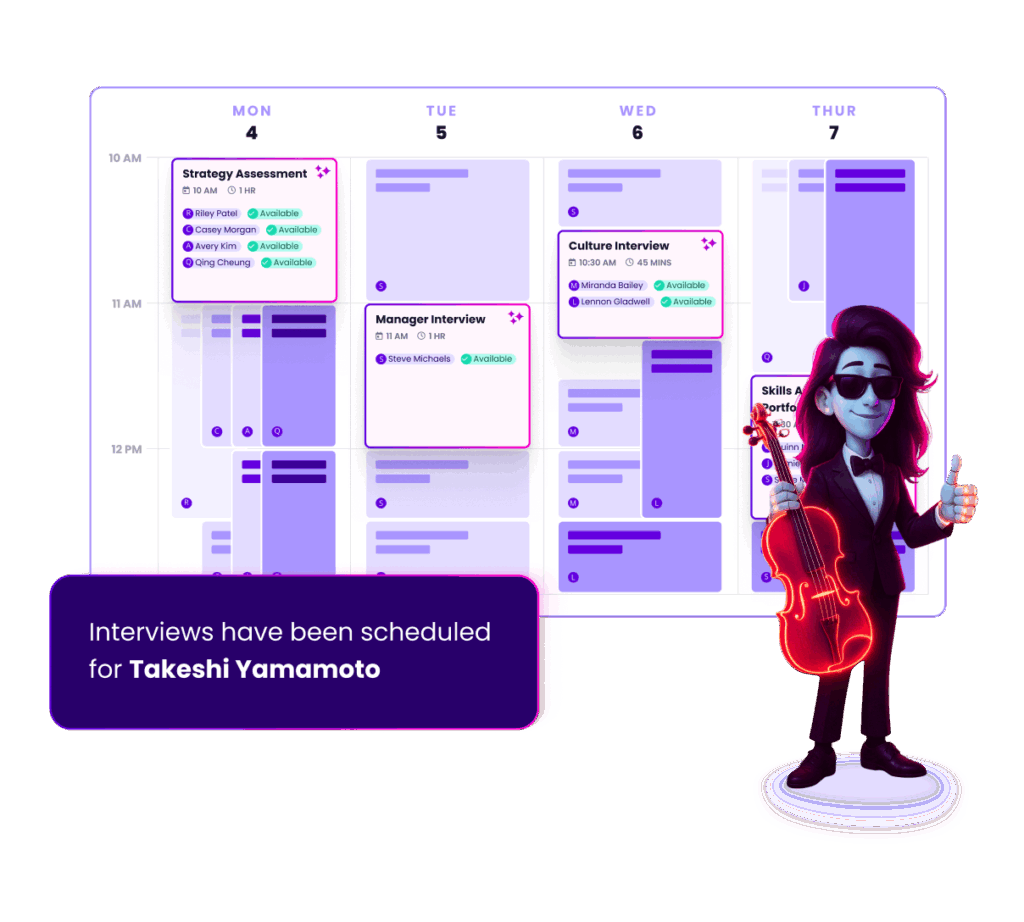Do you sometimes feel overwhelmed by all the processes involved in scheduling an interview? We’ve got your back. This step-by-step guide explains the process clearly and gives you practical tips on mastering the art of scheduling an interview. We provide simple, easy-to-follow steps and tell you how to use technology to streamline your hiring process.
Read on to learn how to make interview scheduling seem like a breeze.
The importance of efficient interview scheduling
Efficient interview scheduling is the backbone of a successful hiring journey. It lays a smooth path for employers and candidates to meet without any unnecessary issues along the way.
Picture this: a top-tier candidate eagerly awaiting their interview, only to face delays and confusion due to scheduling mishaps. Not exactly the first impression you want to make, right?
Efficient scheduling not only saves time but also sets the stage for a positive candidate experience. When interviews are scheduled with precision, it shows respect for everyone’s time and sets the stage for a successful relationship. It’s not just about finding the right time slot; it’s about creating the right impression and starting off on the right foot.

Unlock 2025’s top hiring strategies: Insights from 500+ TA leaders
Be the first to uncover deep hiring insights specific to your sector — straight from the highest-performing TA teams.

Common challenges in scheduling interviews
Scheduling an interview may seem like a simple task, but it can be tricky. You need to juggle multiple schedules, coordinate time zones, and find a perfect slot where everyone is available.
Surprisingly, even in today’s tech-savvy world, some talent acquisition teams are still spending a whopping 35% of their time trying to line up interviews. That’s a lot of valuable time spent focusing on logistics instead of finding the best candidates. So, while scheduling interviews might seem straightforward, the reality is that it’s a major challenge that can eat up a sizable chunk of resources.
Steps for scheduling interviews effectively
This section will give you the key elements you need to check off your list for an effective and successful interview schedule:
Identifying suitable time slots
Begin by finding suitable time slots. After this, scour the calendars to pinpoint availability windows for both candidates and interviewers, then find a time when both schedules align. Pro tip: aim for flexibility to accommodate diverse schedules. Flexibility means keeping your options open and being willing to adapt.
Coordinating with candidates and interviewers
After identifying available time slots, the next step is to start coordinating with everyone involved. This is where the real magic occurs – bringing everyone together like a conductor leading an orchestra.
This step involves reaching out to both candidates and interviewers and informing them about the scheduled time, noting their preferences, confirming the details, and making sure both parties are on the same page. Clear communication is crucial here.
Considering time zones for remote interviews
The third step is consideration of the location of everyone involved. In today’s interconnected world, remote interviews are becoming common. They allow us to bridge geographical divides but can be complex when multiple time zones are involved. Suddenly, you’re coordinating schedules and considering different time zones.
Sending confirmation and reminders
Once the interview has been scheduled, send a confirmation email or message to both the candidate and the interviewers. Include all relevant details, such as the date, time, interview location, and any instructions or additional information. Additionally, send reminder messages to all parties a day or two before the scheduled interview to ensure everyone is prepared and on time.
Handling rescheduling and cancellations smoothly
Despite careful planning, there may be instances where rescheduling or cancellations are necessary. Manage these situations graciously by communicating promptly with all parties involved and offering alternative options whenever possible. Maintaining open lines of communication and being flexible can help minimize disruptions and ensure that the interview process continues smoothly.
Following up after the interview
After the interview has taken place, follow up with the candidate to thank them for their time and provide any necessary feedback or next steps in the hiring process. This demonstrates professionalism and keeps the candidate informed about the status of their application.
Seeking feedback and continuous improvement
Finally, seek feedback from the candidates and interviewers about their experience with the scheduling process. Use this feedback to identify any areas for improvement and make adjustments as needed to streamline the process further. Continuous improvement is key to ensuring a positive candidate experience and optimizing the efficiency of the interview scheduling process.
So, whether you’re scheduling interviews for a single candidate or finding a whole team, these steps help ensure everything runs smoothly. By carefully identifying suitable time slots, coordinating with involved parties, noting the different time zones, sending interview confirmations, handling reschedules and cancellations smoothly, ensuring follow-up, and seeking feedback, scheduling interviews becomes a walk in the park.
Scheduling tools and software
Technology can be a beneficial tool when it comes to scheduling interviews. Technology can assist by taking care of all the nitty-gritty details, leaving you free to focus on the crucial aspect: finding your perfect candidate. Interview scheduling software, like GoodTime, acts as your personal assistant, making the whole process easier from start to finish. Say goodbye to the hassle of organizing interviews manually and hello to automated efficiency.
GoodTime has specific features that simplify interview scheduling and eliminate the hassle of coordinating interviews. These features include syncing calendars, automatic selection of the right interviewers, effortless management of interviewer training, automation of interview coordination through SMS, WhatsApp, and emails, and many more.
If you are tired of shuffling interview schedules and all the work in between, allow technology to give you a helping hand. Check out GoodTime and see how your scheduling game will upgrade.
Upgrade your hiring journey with AI
GoodTime’s AI agents orchestrate the entire hiring journey — screening, scheduling, messaging, and more — so talent teams hire faster with a better candidate experience.

Tips for using scheduling tools and software
If you want to take advantage of technology to take your interview scheduling game up a notch through scheduling tools and software, you will need to know how to use these tools. Here are seven tips to help you master scheduling tools and software.
- Familiarize yourself with the features: Firstly, take some time to explore the features of your chosen scheduling tool. Check for essential features that you will need to improve your scheduling game, from calendar syncing to automated communication and a lot more. Understanding what the tool can do will help you leverage its full potential.
- Sync your calendars: One of the most valuable features of scheduling tools is calendar syncing. Ensure that all relevant calendars, including those of interviewers and candidates, are integrated into the tool. This will prevent double bookings and save you from the headache of manually checking availability.
- Take advantage of automation features offered by scheduling tools: Make use of the automatic interviewer selection and the option of sending out reminder emails and automating repetitive tasks. Doing this will save you time and reduce the risk of human error.
- Customize your settings: Tailor the settings of your scheduling tool and software to suit your needs. Whether you prefer to schedule interviews in specific time slots or set certain criteria for interviewer selection, customizing your settings will help you work more efficiently.
- Communicate clearly and consistently: Clear communication is vital to successful interview scheduling. Use your scheduling tool’s messaging features to keep all stakeholders informed throughout the process. Be sure to communicate any changes or updates promptly to avoid confusion.
- Stay organized: Keep track of all your scheduled interviews and associated tasks within the scheduling tool. Use features such as tagging or categorizing to organize interviews by status or priority. Staying organized will help you stay on top of your workload and ensure nothing falls through the cracks.
- Seek feedback and adapt: Finally, don’t be afraid to seek input from your team or candidates on the scheduling process. Use this feedback to identify improvement areas and adjust your approach. Continuously refining your scheduling process will help you work more efficiently in the long run.
Best practices for communication with candidates during scheduling
When communicating with candidates during the scheduling process, there are a few important rules to follow. GoodTime has text recruiting, allowing your recruiters to send WhatsApp messages from your own application tracking system or website. In this way, you can maintain good organization and security over your candidates’ information. Here are 10 best practices to implement for good communication with candidates during scheduling:
- Be prompt: Respond to candidate inquiries and scheduling requests quickly. Timely communication respects the candidate’s time and maintains their interest in the opportunity. Also, if there is any need to cancel, message the candidate beforehand.
- Set clear expectations: Clearly communicate the next steps in the interview process, including what the candidate can expect and any additional information they may need to provide.
- Provide options: Offer candidates multiple options for interview times whenever possible. This shows flexibility and accommodates their schedules, making the process more convenient for everyone involved.
- Confirm details: Once an interview time has been agreed upon, send a confirmation email or message outlining the details, including the date, time, and location (if applicable) and any instructions or additional information the candidate may need to know.
- Send reminders: Send a reminder message to candidates a day or two before the scheduled interview to ensure they don’t forget. This helps reduce the likelihood of no-shows and provides a smooth interview process.
- Be flexible: Understand that candidates may have unforeseen circumstances and require rescheduling. Be flexible and accommodating when possible, and work with the candidate to find a new suitable time.
- Maintain professionalism: Maintain a professional tone in all communication with candidates, whether through email, phone, or text messages. Avoid using overly informal language or emojis, which can detract from your professionalism.
- Be responsive: Be available to answer any questions or address the candidate’s concerns throughout the scheduling process. Promptly respond to messages and assist when necessary to ensure a positive candidate experience.
- Follow up: After the interview has taken place, follow up with candidates to thank them for their time and provide any necessary feedback or next steps in the hiring process.
- Seek feedback: Lastly, seek feedback from candidates about their experience with the scheduling process. This can help identify areas for improvement and ensure that future candidates have a positive experience.
In summary, keep the lines of communication open, be prompt in notifying the candidate, and offer alternative options whenever possible. By following these best practices, you’ll streamline the scheduling process and leave a positive impression on candidates, setting the stage for a wonderful experience.
Final thoughts
Efficient interview scheduling is crucial for a successful hiring journey. It sets the stage for a positive candidate experience and saves valuable time. Despite its importance, scheduling interviews can be challenging, with talent acquisition teams spending considerable time on logistics.
Our step-by-step guide simplifies this process, offering practical tips and leveraging technology like GoodTime to streamline scheduling. Clear communication with candidates, using tools like texting platforms within your ATS, ensures a smooth experience. Graciously managing rescheduling and cancellations is also vital.
Following these best practices will save time and leave a positive impression on candidates, paving the way for successful hires and working relationships.




